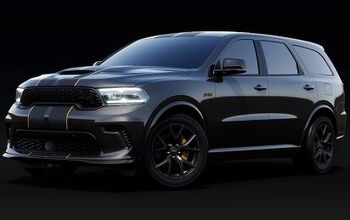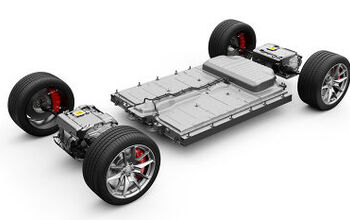Volkswagen and Ford Move Closer to an Agreement on Autonomy, Electrification, Assembly

Volkswagen AG and Ford Motor Co. continue to become more chummy with each passing day. They may even be on the cusp of sittin’ in a tree, K-I-S-S-I-N-G.
After signing a Memorandum of Understanding in June, executives are now hinting at widespread collaboration. Ford wants help in Europe and Latin America, areas awash in a sea of red. Volkswagen wants a piece of Ford’s self-driving technology, while the pair would work together on electric vehicles, according to recent reports. It’s worth noting that Ford, which has proven more open in discussing the matter, previously said nothing would be off the table if the two joined forces.
The most recent update concerns VW’s proposed investment in Ford’s self-driving partner, Argo AI. While both companies are dead set on a future of “electro mobility,” both fall short in critical areas.
Over the past few years, Ford managed to get quite a bit of autonomous testing under its belt, but it’s not seen as a leader in the field — though how far it actually lags behind General Motors is debatable. Meanwhile, Volkswagen promised widespread electrification by 2022 and expects to build up to three million electric vehicles annually by 2025. Right on cue, supplier issues have cropped up. The Blue Oval’s vision is similar to VW’s — a continued shift towards light trucks, with a flagship EV in the wings and more electrification to follow. But it doesn’t appear as if Ford will have a glut of competitive battery-electric vehicles on the market for some time. Gaining access to Volkswagen Group’s MEB platform could change that… theoretically.
According to Bloomberg, people familiar with the situation claim the two might solidify initial agreements by the end of end of this year or early 2019. VW refused to say what that might entail; Ford said it’s currently in discussion with VW over potential collaborations across multiple areas but that it would be premature to share additional details. Neither has any plan for a cross-shareholding arrangement like Nissan Motor has with Renault.
That’s not much to go on, though Volkswagen CEO Herbert Diess recently confessed to Automotive News that Ford could gain access to the MEB platform and that the Germans could use the Ranger pickup to replace the Amarok on the global market.
Even more rumors include discussions of VW offering the pint-sized Caddy van to Ford in exchange for the Americans building a replacement for the T6 Transporter at its own van plant in Turkey. We probably won’t see the bastard offspring of either arrangement in North America.
On the autonomous side of things, Volkswagen’s investment in Argo would likely mimic Honda’s conditional $2.75 billion investment in General Motors’ Cruise division. Still, with the two companies so wrapped up in everything else, we doubt it would implement the same stipulations that Honda did with GM.
“We’re having a very broad set of discussions about how we can help each other around the world,” Ford CFO Bob Shanks told Bloomberg last month. “Collaboration isn’t being limited in any way whatsoever.”
The marriage makes a lot of sense, honestly. Automakers are terrified that governments, especially those in Europe and China, will prohibit everything that isn’t electric from entering major cities in the coming years. Not having a lineup of vehicles that can adhere to that specific brand of vehicular authoritarianism would be a death sentence for an automaker. Likewise, autonomy is seen as the key for opening up the door to new business opportunities that could be worth trillions in the coming decades.
Now, we’ll just have to see if they can pen an agreement both parties can shake on. It’s looking like they’re already in the home stretch.

A staunch consumer advocate tracking industry trends and regulation. Before joining TTAC, Matt spent a decade working for marketing and research firms based in NYC. Clients included several of the world’s largest automakers, global tire brands, and aftermarket part suppliers. Dissatisfied with the corporate world and resentful of having to wear suits everyday, he pivoted to writing about cars. Since then, that man has become an ardent supporter of the right-to-repair movement, been interviewed on the auto industry by national radio broadcasts, driven more rental cars than anyone ever should, participated in amateur rallying events, and received the requisite minimum training as sanctioned by the SCCA. Handy with a wrench, Matt grew up surrounded by Detroit auto workers and managed to get a pizza delivery job before he was legally eligible. He later found himself driving box trucks through Manhattan, guaranteeing future sympathy for actual truckers. He continues to conduct research pertaining to the automotive sector as an independent contractor and has since moved back to his native Michigan, closer to where the cars are born. A contrarian, Matt claims to prefer understeer — stating that front and all-wheel drive vehicles cater best to his driving style.
More by Matt Posky
Latest Car Reviews
Read moreLatest Product Reviews
Read moreRecent Comments
- HotPotato Honestly VW should have bought Canoo too -- the Canoo is a much better rendition of a modern VW van than the actual VW EV van, which is just a standard generic Euro delivery van disguised by a vintage 2-tone paint job.
- Tassos No, because I am not one of these idiot fanatics who buy a new model in its first year of production, bugs and all (not to mention they usually are charged a stiff premium over MSRP from their greedy Dealer-Stealer)
- HotPotato The Ariya's trim levels are so confusing that they should also hire a navigator to walk the customer through how to get the car they want. Or an online configurator where you check off the things you want and it leads you to whichever obscure version offers them (if GM can do it, why can't Nissan?). God help you if you have a simple request like "I just want the tan cloth interior and Bose, which model offers that?" The website can't help you and neither can the dealer; they're as confounded by the whole Ariya array as you are.
- Tassos So Tim believes that if you steal an item (here, CONDOMINIUM ASSOCIATION ELECTRICITY) priced less than a certain amount, you should be allowed to do so with no consequences. He is lucky some litigious Condo Board member did not SUE HIM. I bet they wanted to, but knowing he is destitute, their lawyer discouraged them from doing so.
- HotPotato Yup. I bought a 2013 Ford C-Max new. It was quiet, quick for a hybrid, economical, had a cavernous and well-finished interior with fold-flat seats for dogs, and rode and handled with the sophistication of a fine European sedan. Never mind that it was new to the US, it had been on sale for years in Europe so surely they had it right by now, no? No. There was the twice-annual dead battery (took them three years worth of TSBs to figure that out), the multiple safety and functionality recalls, the dysfunctional infotainment, the MPG scandal (twice), the front suspension that bottomed out on the gentlest dips, the transmission that failed due to a known defect, and by 30k miles the car had the torsional rigidity of a wet dishrag. This, I later learned, may have had to do with failed A-pillar welds, something they didn't bother informing owners about. All this probably had something to do with it losing 80% of its value by the time I traded it in a few years later...a value so low even the used-car lowball specialist went back to double-check it. I loved the car despite its many flaws but gawd, never again a first-year Ford.


































Comments
Join the conversation
Well, I've been trying to tell everyone that the US manufacturers will be challenged due to the unique regulations, tax structure, etc that has created the US market to become a Jurassic Park. The US large vehicles are nice, but, the US needs to become more competitive and build what the world wants. The US vehicle market is becoming less significant as the economies of production and volume diminishes the "world's most dominant" vehicle market. The US market is big, but the world without the US is 85% of the market. Ford's reliance of F Series sales is ridiculous as the F Series is very protected with huge barriers removing external competition. Ford is not able to compete outside of the US competitively. The idea that the "world is against US vehicle manufacturers because the US is so generous" is ridiculous as well. The reason is the rest of the global manufacturers are able to be more competitive in those global markets, and the US manufacturers seem to be floundering. Maybe the "old school' US business model is becoming defunct and the manufacturers have become totally reliant of protection of the large vehicles. It think we are getting much closer to D Day for the US manufacturers. The US Government needs to come up with a plan to force the US manufactuers to be weaned off of the huge protection offered to pickups and their related SUV station wagons. Ford, you have done this to yourself via poor decision making and management over the past number of decades, like the Aussie manufacturers did (again managed by the US, FoMoCo and GM).
Dont pay him much mind. He's from a land and long line of castoff criminals. Considering his country literally contributes nothing to the rest of the world, the gloating and stuck up attitude is precious. Oh well, changing trends make it hard for companies sometimes, just gotta change to suit the times. Ford will be fine.